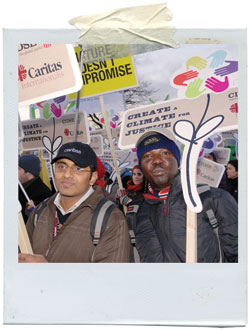


Deal comprehensively with developing countries debt and develop an open, rule-based, predictable and non-discriminatory trading and financial system. Address the special needs of the least developed countries, and make the benefits of new technology available to them.
The United Nations estimates that unfair trade rules deny poor countries of $700 billion every year. There has been little progress on true preferential treatment for developing countries.
The poorest 49 countries make up 10 percent of the world’s population but account for only 0.4 percent of world trade. That in itself has halved since 1980.
Poor countries lose 14 times the money they get in aid because of unfair trade rules. They lose more and more as their tariffs are forced down by developed countries.
Only Denmark, Luxembourg, the Netherlands, Norway and Sweden have met or exceeded the target of giving 0.7 percent of their GDP in development assistance. The rich world set this target in 1970.
35 countries have qualified for debt relief under the Highly Indebted Poor Countries Initiative, receiving $51 billion over time. Debt service ratios in poor countries have declined but the economic crisis suggests harder times ahead.
Almost a quarter of the world’s population is now on-line but only 1 in 6 people in the developing world have access to the internet. Mobile phone penetration in Africa now exceeds 30 percent of the population, and is used for banking, crop pricing and health care.

Rodolfo Arteaga is back to being a farmer these days, selling what maize he manages to grow in the Honduran village of Palo Ralos. But he says the Siria Valley is nothing like it was when he farmed in his old village less than a kilometre away. “The streams and wells have dried up and we have droughts now. The mine used much more water than it was allowed to. Then, in May of 2010, we had a flood because of the environmental damage and contaminated water ran out of the mine.”
Rodolfo, 45, is talking about the San Martin open cast gold mine, which occupies land his family lived on for 150 years. It is operated by Entre Mares, a Honduran wholly-owned subsidiary of the Canadian mining giant, Goldcorp. “We moved off because we had no choice. The mining company told us if we didn’t accept their offer of $5000 per family, the government would evict us with force. They promised us jobs, and I worked for them for 4 years before but I got sick. Like me, three of my five children have chest and skin problems.” Data gathered by academics from Newcastle University showed evidence of dangerously high levels of heavy metals in water flowing into a local stream. Entre Mares and Goldcorp reject this. The pollution by Goldcorp is now the subject of a criminal investigation by the Honduran authorities.
Grandmother Berta Estrada tells a similar story. “The water became contaminated when the mine started operating in 2000. It’s been tested. Now the cattle are dying.” Berta also complains that she was forced off her land, and says half the families who were relocated are vulnerable because they still don’t have any legal title to where they live now.
Caritas Tegucigalpa has helped the people of the Siria Valley speak out against the exploitation of their environmental and human rights, and has lobbied the Honduran government with them for better protection and more transparent mining practice. Pedro Landa helped more than 200 people with health problems – from investigation to treatment during his time with Caritas Tegucigalpa. “We are committed to this because the communities felt overwhelmed and impotent. As a father myself, I feel angry at how the future of the young – their economic resources and their health – is being destroyed.”
Pedro went to Canada to speak to Members of Parliament, who also visited Honduras to see the situation for themselves. During a 3 year advocacy campaign, Development and Peace (Caritas Canada) spoke to 120 MPs and delivered 200,000 signed postcards to the Prime Minister. Now a Private Members bill holding Canadian companies to the highest standards at home and abroad in environmental and human rights has passed its second reading.
The San Martin mine is scheduled to close, but Caritas is still worried about the lack of serious and transparent plans to clean up the toxic legacy they have been left with.
Photos: (top) Climate justice campaigners in Copenhagen. Caritas Denmark, (below) Berta Estrada. Annie Bungeroth/CAFOD
Press for 100 percent cancellation for the poorest nations. Keep the spotlight on continuing and enhancing the current programme of relief for heavily indebted poor countries.
Congratulate countries like Nigeria which is using $750 million in debt-savings to train new teachers and Cameroon which is spending its money on education to stop the spread of HIV/AIDS.
Create tariff and quota-free access for exports from the least developed countries.
Petition the developed world to live up to its promise of spending 0.7 percent of GDP on overseas development, not the 0.31 percent which remains the average.
Use what we have learned about environmental trade exploitation to press for legislation forcing multi-national companies to act more responsibly in the developing world.
Advocate for more technical help to poorer countries to develop their trade and production capacities, and make sure this is without strings and fairly priced. Increase access to the internet and mobile phone technology at prices the developing world can afford.